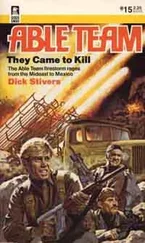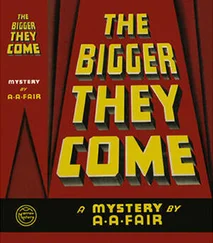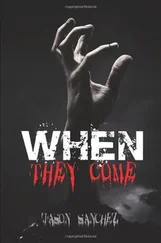But that clanging. Somehow he knew what it was and who was making it, though he’d never heard that exact sound before and couldn’t have said how he knew unless it was some sixth sense like the sense that told Colter when there were hostiles about. She was saying, “They might come to my house but I’ll just play dumb and say, ‘I thought you had him’ and then get angry and say, ‘What are you telling me — that he got away? Or what, you didn’t. .’”—she turned to him, grinning, pretending to be someplace else talking to somebody else and not him at all—“‘send him out for adoption?’ And then I’ll pause and let my face go dark. ‘Or no, don’t tell me you put him down ? Because if you did—’”
The house was there under the trees and the river was down below it. Ever since the cops had taken his car away he’d had to hitch into town for groceries, though his mother would come pick him up, was happy to come pick him up — and she’d done it a couple of times — but that wasn’t independent, and after a while when she pulled up to the house that used to have a phone before he uprooted it and tossed it in the river where it could go deep and talk to the minnows and steelhead in every human language, he would duck out the back door, slip over the wall and into the woods, and then he went to the locksmith and changed the locks so she couldn’t get in.
Sara said, “Is this it?” and he nodded and she put on her blinker to turn into the gravel drive even as he saw the bishop pines screaming with sunlight and the three brown plastic overflowing trash cans no one ever seemed to come and pick up and the big object, the real thing, the thing that slammed at him like a missile shot out of nowhere — his father’s car, parked in the shadow of the wall like it belonged there.
“Shit,” he said. “ Shit .”
The car lurched to a stop. She put it in park, cut the engine and turned to him. “What’s wrong?”
He just pointed at the car in front of them, a new Toyota hybrid his father had bought as a retirement present to himself, a statement on four wheels that might as well have had a loudspeaker attached to it trumpeting its miles per gallon and crying out against the spoliation of the earth and the four hundred parts per million of CO 2in the air. That was a good thing, he wouldn’t argue with that — it made sense to cut down on gas-guzzling, of course it did — but if you really wanted to get serious you’d just send the car back to Japan and use your own two legs to get around. His father didn’t need a car. Nobody needed a car. That was what feet were for. Tell it to Colter: he didn’t even have a horse.
The clanging faltered, intermittent now, and then it died altogether so that the little noises — of insects, the river, birds in the trees — came back to establish themselves in a soundloop that was as steady as the beating of his heart. Out of the car went the dreadlock dog the minute Sara cracked her door and then they were out in the yard and the dog was lifting his leg against something that hadn’t been there before, rubble, a pile of rubble that looked like busted-up cinder block. And then the clanging started up again and he thought of his father and how his father had got in his face when he saw the wall for the first time, shouting “Where’s your brain? You build an eight-foot wall without a doorway, what are you thinking? Or are you thinking, are you thinking at all?”
His father had shouted for a good fifteen minutes and then gone home and come back with a stepladder and he’d watched him — an old man with a scorched-earth face — climb up to perch crotch-wise on the lip of the wall and hoist the stepladder up behind him so he could ease it down the inside, and then his father was there, in the compound, and he was shouting all over again.
“It’s to keep people out,” he’d said in his own defense. “I can climb it. And I don’t need any ladder either.”
But now, now there was a doorway-sized hole in the wall and a pile of busted-up cinder block in the yard and even before the dreadlock dog had got done with his yellow arc of piss here came another fractured block, flung through the doorway to clack against the pile and send the dog off yipping as if he’d been hit, which he hadn’t. Sara snapped a look at him like he was the one who’d thrown the thing and called comfort to the dog while those little brown birds with the forked white tail feathers shot like bullets across the yard and the sun flared and flared again. That was the moment his father appeared in the jagged new doorway, dressed in his hiking boots and jeans, his T-shirt sweated through and a pair of stained work gloves on his hands. His father’s face took up a wondering look and then discarded it. “Adam,” his father said, and his tone was neutral because he was surprised to see Sara there beside him, as if she’d crawled out of some secret passage deep under the earth like a gopher or a mole, a thing that went around on all fours, and Let’s do it doggie-style, she’d said the second time, do you like it doggie-style?
“Hi, Sten,” she said, and he watched his father’s eyes fall into their twin sinkholes for just an instant as he tried to place her and then his father said “Hi” back and added her name, to prove he knew her. And more: his father was calculating, the two of them in the same picture, her with her big tits and the dreadlock dog that was sniffing at his leg now, putting two and two together, fucking in his mind, fucking, fucking.
“Nice to see you again,” Sara said, and his father dredged up a smile for her. “How’s retirement treating you? You did retire, right — isn’t that what I heard?”
His father put both his palms on his forehead and swept his hair back, gray hair going to white, the kind of thing a Blackfoot brave would have prized on a dripping scalp, then unfastened the rubber band pinching his ponytail, patted the loose hairs in place and refastened it, all in three seconds flat. This was his characteristic gesture. Or one of them, anyway. Hair. He had hair. “That’s right,” his father said. “Just got back from a cruise, in fact. Down south. Maybe you read about it? Or saw it on TV?”
She was wearing her jeans and shit-kicking boots, nothing to see there, so far as fucking was concerned, but her big tits were sticking out of a little turquoise blouse the size of a rag and you could see her navel too. And her belly. Her belly that was like a wave at sea and just as soft once it washed over you. “Oh, yeah,” she said, “yeah. Of course.” She raised her right hand to smack her head in a duh! kind of way. “That must have been terrifying.”
His father shrugged.
“I heard it was three of them. Mexicans, right? In Mexico?”
“Costa Rica.”
“Costa Rica? Jesus, I thought that was supposed to be safe—”
“Yeah, well, nothing’s safe,” his father said, and why did he look at him as if he’d had anything to do with it? He wasn’t there. He didn’t kill anybody. “It could happen anywhere. We were just lucky, that was all.”
“Three of them,” she repeated, “and they were armed and you had nothing but your bare hands? I’d say that’s more than luck.”
Another shrug, his father the hero, the killer. “You let two of them get away,” he heard himself say. He could feel his father’s stare boring into him, but he wasn’t going to look up and acknowledge it — he was watching the way Sara’s reptile boots shifted in the dirt, the two little silver gleams there at the toes of them, shit-kickers . “So did the guy’s eyes pop out or what? Like a frog when you step on it?”
“Adam,” his father said, and he heard the tone of it and knew it, the tone that cut him down to size, diminished him, made him nothing more than a boy, a child, an infant, as if what he said was always stupid and irrelevant and nobody wanted to hear it.
Читать дальше












